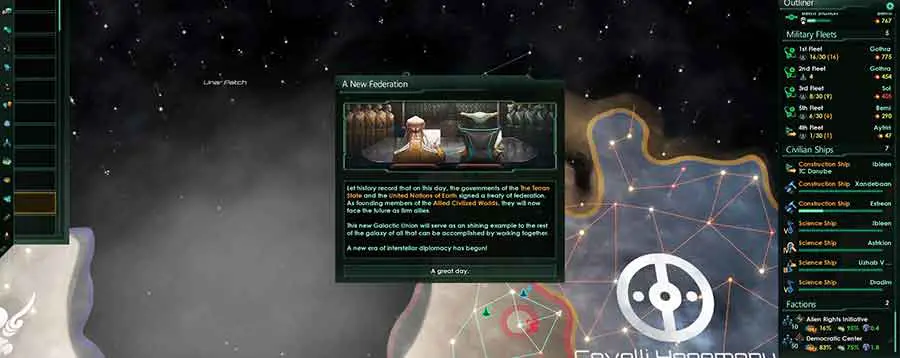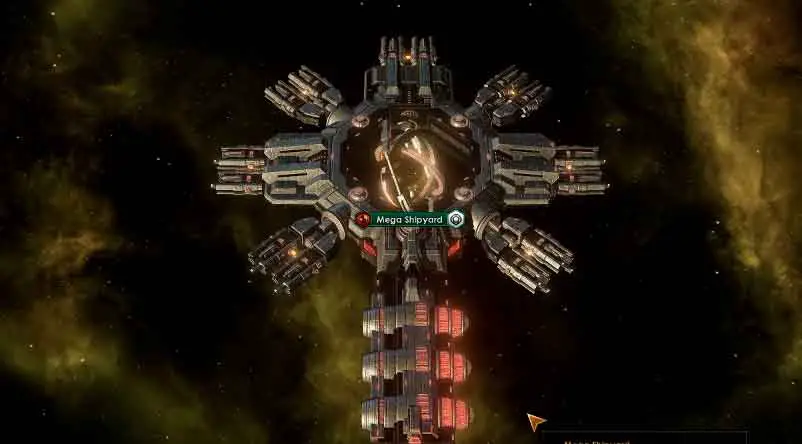
Stellaris Federations greatly enhances the diplomacy options in the game. Major additions include a much improved Federations system plus other major features, like the Galactic Community. Since Paradox makes major updates to the base game with some free portions of the DLC included in the game it’s impossible to take a look at the Federations expansion all by itself, so I started a new game with the sole purpose of seeing how the DLC changed the gameplay.
This is a great expansion, so Federations is definitely worth it. It makes Diplomacy much deeper by adding Envoys, the Galactic Community and Federations. The Origins add a new twist to the game startup, and with the addition of Juggernauts and Mega Shipyards (yes, you can build 30 ships at a time!) it makes an already diverse game even more so.
For me Stellaris was the easiest of all the Paradox games to learn. It is easy to understand the systems in the game but a little tougher to decide on the optimum combination. That’s where your playstyle and strategy come into the mix.
Read More: Find out how to conquer the universe at my How to Play Stellaris page.
I played a new game of Stellaris for a little over 7 hours before I could finally founded my first Federation. I like to pause the game a lot so I can drink in the information from the pop-up screens and devise and revise my day-to-day strategy as the game progresses. If you don’t pause too much you’ll be able to start your first Federation much sooner.
Since I wanted to play using one of the new Origins I created a custom empire for this game. I like playing as some type of Human empire, so I modified a human empire that I had already created, the Terran State.
I replaced the Adaptive trait with the Ingenious trait and replaced the Idealistic Foundation civic with Cutthroat Politics. I liked the Edict reduction that gave me (20%). The Diplomatic Corps with its 2 additional Envoys and additional Diplomatic Weight of 10% might have been a better choice but I liked the Edict reduction better, it saved on Influence costs more than the Diplomatic Corps did. I also chose the Lost Colony Origin.
The Galactic Community
Everything played the same until the year 2226 when I received an invitation to join the Galactic Community which I accepted. A little less than a year later the Galactic Community was established.
There are three main parts to the Galactic Community, the Community, Senate Floor, and the Resolutions. At the Community screen you can see what the Resolution Queue is and what your stance is concerning it. You also can see Galactic Community members and what Galactic modifiers are in effect, like empires gaining an extra 20% diplomatic weight from the economy or Army Upkeep costing 5% more. It is interesting and fun to be able to pass resolutions that change the rules of the game.
The Senate Floor, if in session, shows what the current resolution is and who supports it and who is against it. The Resolutions screen tells you what Resolutions are available to propose and be debated on. Since the Resolutions cost Influence, and since I was more interested in using my Influence for expansion, I decided not to propose any Resolutions.
Most resolutions will not be liked by all Federation empires. Any Federation member can initiate a Resolution but it can only have one pending resolution at a time. After being proposed it moves into the Proposal Queue, where it waits its turn on the Senate Floor for debate and finally a vote to determine if it will go into effect.
An empire can trade for favors at the Diplomatic screen. These can be used on Resolutions, you can call in a favor or two to help the Resolution you favor pass a vote and become law.
One resolution I found particularly interesting was the Galactic Council. Like the United Nations Security Council it can be created by passing the Galactic Council Resolution. The three empires with the highest diplomatic weight will become the members and membership can change once every 20 years. That number can be changed through additional resolutions. This Council is given special powers for things like vetoing Resolutions or establishing emergency measures during a time of crisis.
You can always leave the Galactic Community if you become the object of too many sanctions or negative resolutions, but you lose the benefits of belonging to that organization as well.
The Galactic Market is now created by the Galactic Community and is formed through a Galactic Focus Resolution.
Envoys
Envoys are now part of the game and can be used a diplomats. They can be used to improve or harm relations between empires and to change an empire’s opinion of you. They can also be used as delegates to the Galactic Community to improve your Diplomatic Weight or can be assigned to your Federation to increase cohesion. They have many uses and there usually aren’t enough to go around.
Creating a Stellaris Federation
Expansion is always the first thing on my mind in Stellaris so I chose the Expansion Tradition first when Traditions became available. The second Tradition I chose was the Domination Traditions so I could get the Finisher Effect of 1 more Influence point per month. That was a mistake on my part, I still had Influence gains on my mind because I had just finished updating my Stellaris Influence article, so this gives me the chance to give it a shameless plug. You can find out how to get Influence and expand quickly at my Stellaris Influence page.
Instead of continuing down the Domination Tradition Tree I changed over to the Diplomacy Traditions and chose “The Federation” Tradition when it became available since you can’t establish a Federation without having it first, although you can join one if invited. I managed to get that Tradition in the year 2227.
The United Nations of Earth was the empire I had the best relations to start out with plus they were on my border so I decided they would be good ones to form a Federation with. I made all the pacts and agreements I could with them, plus I assigned an Envoy to improve relations, but they would not accept my Federation invitation until I renounced offensive wars. After doing that they gladly formed a Federation with me in the year 2239. Guess I can change my war polices later when the Federation cohesion is high enough. There are a lot of requirements that need to be met for the Federations so the only one that was available to me was the Galactic Union, so the Allied Civilized Worlds was founded. More about the other Federation types later.
Since I was the one establishing the Federation I was made the President. The cohesion was at zero and I was leaking XP points at the rate of 3.5 per month so I assigned an Envoy to reverse that trend.
Unlocking different levels in your Federation gives added bonuses if approved by the members. I’m playing as a Galactic Union and the first level doesn’t offer much in the way of benefits. The only real advantage is that differing ethics between empires has a 50% smaller impact to cohesion.
At level 2 expanding Federation membership to new members causes 50% less loss to the Federation cohesion and the number of envoys you have is increased by one. Higher experience levels gives even better bonuses. For instance, at experience level 5 the Federation can inflict 25% more damage to the End Game Crisis factions, a nifty little bonus.
Increasing Federation Centralization to Low unlocks several laws, like fleet contribution, succession type, war declaration, etc. Increasing Centralization may impact federation cohesion negatively but the benefits outweigh that drawback.
The members screen is obvious in what it does, it lists all members and some stats about their technology and fleet size.
The Fleets screen will list fleets you may have and at level 1, at least for a Galactic Union, you will not be able to support any fleets. Laws are limited at level 1 too. You can change succession laws from Rotation to Random but things like declaring war will require a unanimous vote instead of a majority vote.
Passing a new law like the War Declaration law means that instead of a unanimous vote to declare war, that law is modified so that it only takes a majority vote to declare war instead. At level 4 the President decides on whether war should be declared or not, if you can get that law passed, giving your empire a lot of wartime power if your leader happens to be President of the Federation.
Mega Shipyard

The Mega Shipyard Federations adds is awesome! This is an amazingly huge shipyard that, like most mega structures, must be built in phases, this one consisting of three. It can build ships during any phase of its construction once the first stage is complete but phase one will only provide ten shipyards instead of the thirty available once the third phase is finished, so reduced production will be the result until then. Once finished (phase 3) the shipyard also provides a 100% ship build speed increase too. Can you imagine pumping out 30 ships at a time if you have the resources? A great structure to have during any wartime effort!
These shipyards cannot have defensive modules added so it’s best to protect them, either with an upgraded starbase or a fleet close by to provide support if it gets attacked. If you have Gateway technology researched it’s even better to place these Mega Shipyards deep in your territory and build a Gateway. This will enable you to produce fleets quickly and safely, and by using the Gateways, get them to trouble spots fast, provided you have another Gateway close to the troubled area.
Read More: Find out how to build the other mega structures at my Megastructures Page.
Juggernaut
Juggernauts have been added to the game, which are even bigger ships than titans. This ship blurs the line between a massive ship and mobile starbase since it can serve the basic functions of both. Juggernauts require the Citadel and Battleship technology to be researched. This ship is slow and cannot be sped up, plus it cannot become part of another fleet so you have to be careful not to leave it behind close to enemy territory or it could become fodder.
Federation List
The hardest part of this DLC was actually a dislike for me. I disliked being surprised at how restrictive the requirements are for the Federation types, it would be good to at least know in advance that there are some, which is why I created the table below. It lists what the required Civics and Ethics are for each one.
| Name | Requirements |
| Galactic Union | Seems like anyone can join, the closer everyone’s Ethics the better the cohesion is in the Federation. |
| Trade League | Must be a Megacorp or have Merchant Guilds Civic. |
| Research Cooperative | Must be a Machine Intelligence Authority and either have the Materialist or Fanatic Materialist Ethic. |
| Martial Alliance | Must either have the Militarist or Fanatic Militarist ethic. |
| Hegemony | Must have Rogue Servitor Civic and have either the Authoritarian or Fanatic Authoritarian Ethic. |
My favorite thing about Stellaris Federations is that it adds a whole new dimension to Diplomacy, which was far too shallow. You now have Diplomatic weight to throw around, Envoys to improve relations with, and favors to call in when you need a crucial vote or two on the Senate Floor. Espionage would be another great addition and from what I understand the next major update, Nemesis, will take care of that.
Origins
Last but not least are the Origins. These give a new twist to the game and provide some interesting starting scenarios. The good part about Origins is that if you really want one you can still make changes to your Civics or Ethics to get it before starting the game.
| Origin | Effects | Requirements |
| Prosperous Unification | Start the game with 4 more pops and 2 more districts. | None |
| Mechanist | Start with 8 more pops, robot upkeep reduced by 5%. | Must be some type of Materialist and cannot have Gestalt Consciousness Ethic. |
| Syncretic Evolution | Start with 12 more pops that are effectively slaves. | Cannot have Gestalt Consciousness Ethic and cannot have Fanatic Purifiers Civic. |
| Life-Seeded | Your homeworld is a Gaia World that has several rare planetary features, the drawback is that your species will not thrive on planets of any other type. | Cannot have Machine Intelligence Authority. |
| Post-Apocalyptic | You start on a Tomb world with the Survivor Trait. You like living on Tomb worlds since you have a 70% habitability increase for them, plus your Leader’s Lifespan average is 10 years longer | Cannot have Machine Intelligence and cannot have the Agrarian Idyll Civic. |
| Remnants | You get a Relic world to start out on. | Cannot have Agraian Idyll Civic. |
| Shattered Ring | You get a partially destroyed Ringworld to start with, plus an Arcane Generator to power some of your segments. | Cannot have Agraian Idyll Civic. |
| Void Dwellers | You get 3 Orbital habitats to start with. Your race produces 15% more when living in a Habitat but is penalized heavily on normal planets when it comes to growth and habitability. Hydroponic Farms get one more worker. | Cannot have either the Gestalt Consciousness Ethic or the Agraian Idyll Civic. |
| Scion | You are a vassal of a Fallen Empire. | Cannot have either the Gestalt Consciousness Ethic or Fanatic Xenophobe Ethic |
| Galactic Doorstep | You get a gateway in your home system but it is inactive. | None |
| Tree of Life | Your Hive gains bonuses if a Tree of Life is present or gets penalties if it isn’t. | Must have Hivemind Authority and must not have Devouring Swarm Ethic. |
| On the Shoulders of Giants | Get an Archaeological site at the start of the game. There is an unknown benefactor responsible for it. | Cannot have the Gestalt Consciousness Ethic. |
| Calamitous Birth | You get a large crater on your planet that gives a lot of extra districts and mining districts. You found colonies with Meteorite Colony ships that smash into colonizable planets and cause a lot of damage when doing so (sounds like fun). | Species must be Lithoid. |
| Resource Consolidation | You get a Machine World as your Homeworld. | Must be a Machine Intelligence Authority and cannot have the Robot Servitor Civic. |
| Common Ground | You’re the Leader of a Galactic Union Federation at the start of the game with two other members. Members will occupy habitable worlds close to your home system. | Cannot have the Gestalt Consciousness, Xenophobe, or Fanatic Xenophobe Ethic. Also cannot have the Barbaric Despoilers, Fanatic Purifiers, or Inward Perfection Civic. |
| Hegemon | Start as the leader of a Hegemon Federation with two other members. Federation members will inhabit other worlds close to your home system. | Cannot have the Gestalt Consciousness, Xenophobe, or Fanatic Xenophobe, Egalitarian or Fanatic Egalitarian Ethic. Also cannot have the Fanatic Purifiers or Inward Perfection Civic. |
| Doomsday | Your homeworld will explode in 35 to 45 years. This is listed as a “Challenging Origin.” | None |
| Lost Colony | An Advanced Empire of your species exists somewhere else in the galaxy. | Cannot have the Gestalt Consciousness Ethic. |
| Necrophage | You evolved as a parasite. You look at other races as either someone to add to your empire or as food. You start with 12 pops that are subservient to you. For you habitable planets are those occupied by primitive civilizations. | Cannot have the Gestalt Consciousness, Xenophobe, Fanatic Xenophobe Ethic or Fanatic Egalitarian Ethic. Also cannot have Death Cult or Corporate Death Cult Civic. |
Don’t forget to visit my YouTube channel at https://www.youtube.com/channel/UCcWU6qxVisK93h5guKRVtdg
Most of these sounded real interesting and they were tough to choose from. I went for the Lost Colony Origin but so far have failed to find them and have not even stumbled on a clue about where to find them. Since I’ve already spent a lot more time playing this game than writing this article (I do love Stellaris), I’ll have to wait to find out what happens until later. I’m wondering if they’ll be so glad to see me that they shower me with all kinds of good stuff, or was there a reason they “lost” me and they decide to obliterate me instead.
